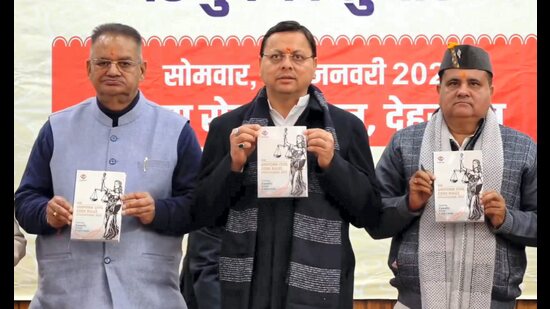Uniform civil code key to true secularism
It is time we understand that while all our energy was diverted towards preserving its diversity, the country’s unity took a catastrophic hit
Such has been the intensity of dialogues surrounding the idea of a “uniform civil code” that one may be well advised to refrain from commenting in its favour, lest they be labelled “communal’. The truth however, is that very few really understand or rather, care to understand what a uniform civil code encompasses. There are two examples already available within the country -- Goa and Uttarakhand -- despite which several absurd conspiracies have been purposefully floated. It is high time the record be set straight.

The foremost legal basis on which the ushering of a uniform civil code is opposed, is that the principle of secularism is a part of the basic structure of the Indian constitution and the same cannot be toyed with. The key to bringing in a uniform civil code is to examine the meaning of the word secularism and whether such meaning would be in consonance with bringing in a common civil code or be in dissonance with it. George Holyoake, a British author, first used the word in his book English Secularism: A Confession of Belief, to refer to a particular non-religious civic and ethical philosophy that would be distinctive from the negative ethical connotation of atheism. Tracing the history and the evolution of the word secularism will reveal that from Martin Luther to John Calvin to John Locke, secularism has always meant a separation between a private realm of conscience which was “religious” and a public political world, which was, in contrast, meant to be irreligious and thereby “secular”.
Secularism “in the Indian context” is a politically constructed con that has long been played on the Indian voter, but one who’s time is now up.
To treat the same people differently despite the existence of a tall provision such as Article 14 in our Constitution, is nothing short of constitutional fraud that has been perpetrated solely to freeride on the chasm caused by identity politics. Chimerical terms such as positive secularism and negative secularism, or even “contextual secularism” have been fabricated to rationalise this ruse. The truth is that secularism in any context, would mean what the word was originally coined to mean — a separation of Church and State. Does this in any way mean that the State is therefore antithetical to religion or religious beliefs? Absolutely not. It only means that the State and its policies are unyielding to religion.
While the word ‘secular’ was added to the Constitution by the 42nd amendment, the distillate of the term had been stirred into the Constitution from its very enaction, in the form of freedom of conscience and religion, but more importantly as a constant reminder in the fundamental rights section of the Constitution to not discriminate on the basis of religion.
Those that lie in the intersection of marginalised groups fall through the cracks -- in this case, the women and children from religious communities that have been taken advantage of. Religious fundamentalists have abused the cracks in Indian political secularism and resisted reform of practices that go against not just the Indian constitution but basic universal human rights. Some even try to sell this oppression as the woman’s free will and her right to religion.
Treating women belonging to different communities with different standards not only qualifies as discrimination on the basis of religion, but also as birth-based discrimination. These practices would certainly not be able to withstand the twin test of Article 14 — intelligible differentia and a rational nexus with the object sought to be achieved. Besides, the Supreme Court has repeated time and again, that fundamental rights are a matter of public policy and the same cannot be waived. While legal rights and privileges can be waived, the doctrine of waiver has no application on matters that are a part of constitutional policy. While modern liberal theorists have never shied away from calling out racial, ethnic, or even purely gender discrimination, these curators of fundamental rights have perpetually overlooked the large subset of women and children who are victims of persecution due to an inequitable exercise of religious rights.
For the longest while, we have been taught that India’s unity lies in its diversity. It is time we understand that while all our energy was diverted towards preserving its diversity, the country’s unity took a catastrophic hit. It is time for the Indian State to bring in a common secular civil code to ensure that we celebrate our diversity, but not at the cost of our unity.
Aankhi Ghosh is advocate, Supreme Court and Bombay High Court, specialising in constitutional and commercial law. The views expressed are personal
All Access.
One Subscription.
Get 360° coverage—from daily headlines
to 100 year archives.



HT App & Website







